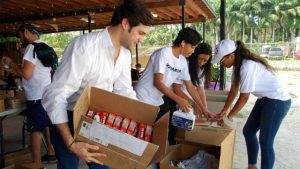 Groups of Venezuelans living overseas are sending tons of supplies, including gas masks, safety helmets and first-aid kits, to support the protesters marching in their homeland against the socialist government of President Nicolas Maduro.
Groups of Venezuelans living overseas are sending tons of supplies, including gas masks, safety helmets and first-aid kits, to support the protesters marching in their homeland against the socialist government of President Nicolas Maduro.
Demonstrations across Venezuela began April 1 and have grown increasingly violent, leaving about 40 dead and many more wounded and jailed.
In Miami, which is home to many Latin Americans and includes a large Venezuelan community, gatherings where donations are collected are becoming increasingly common.
Word of the get-togethers is spread among community members on Twitter, Whatsapp, and Instagram, and identified with Venezuelan flags and signs like “SOS Venezuela” or “Solidarity.” Lists of items required are also posted online.
Most of the donations are designed to protect demonstrators from the tear gas, pepper spray and other crowd-dispersal gases used by Venezuelan riot police.
Over-the-counter liquid antacids are good to treat gas-caused skin burns, while swim goggles and eye drops are popular for eye protection and relief.
Also in demand are hydrogen peroxide to clean superficial wounds, neck braces, and antibiotic cream. Leather gloves, used by demonstrators to pick up and hurl hot gas canisters back at the police, as well as walkie-talkies, are also valued donations.
Medical supplies are especially hard to find in cash-strapped Venezuela, where the oil-dependent economy is in a free fall with triple-digit inflation and acute shortages of food and other basic necessities.
Tons of supplies collected weekly in Florida are sent to the Green Cross, a group from the Universidad Central de Venezuela that helps wounded protesters.
The Green Cross volunteers were recently branded a “paramilitary group” on a state-run VTV television show in Venezuela.
Donations are mainly made anonymously and organizers are usually wary of publicity, fearing repercussions for family and friends in Venezuela.
Anonymity is particularly common online, where several anonymous sites at Amazon.com ask for medicine for Venezuelans. Organizers list what they want; anyone can make a purchase; and the entire transaction, including the final destination of the items, is anonymous.
“Helmets against Bombs,” another anonymous group, accepts donations to buy hard-hat safety helmets and cans of red, yellow and blue paint to identify them with the national colours.
At the Go Fund Me crowd funding site, organizers collected nearly US$23,000 in nine days.
